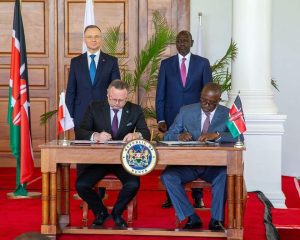In a landmark event underscoring the spirit of global cooperation and mutual progress, CS Mithika Linturi, Minister of Agriculture in Kenya in 2023, recently joined H.E. President William Samoei Ruto for a state visit by H.E. President Andrzej Duda of Poland.
Amidst this auspicious occasion, a significant step forward was taken towards fostering deeper ties between nations, particularly in the realm of agricultural innovation and rural development.
Signing of Memorandum of Understanding (MoU)
At the heart of this historic meeting was the signing of a Memorandum of Understanding (MoU), a document signifying the commitment of both Kenya and Poland towards advancing scientific and technical collaboration. This MoU, signed by CS Mithika Linturi alongside the Deputy Minister of Foreign Affairs of Poland, lays the groundwork for a robust partnership aimed at leveraging collective expertise and resources to address critical challenges in agriculture and rural development.
Unveiling the Vision
Central to the MoU is the shared vision of harnessing the power of innovation and research to drive sustainable agricultural practices and uplift rural communities. By pooling together knowledge, technology, and resources, both nations aim to enhance agricultural productivity, promote food security, and foster socio-economic development in rural areas.
Key Objectives
1. Knowledge Exchange and Capacity Building
A cornerstone of the agreement is the exchange of knowledge and expertise in areas such as crop science, livestock management, agribusiness, and sustainable farming practices. Through collaborative research initiatives, training programs, and technical workshops, both countries aspire to build the capacity of farmers and agricultural stakeholders, empowering them with the tools and knowledge needed to thrive in a rapidly evolving agricultural landscape.
2. Technology Transfer and Innovation
Recognizing the pivotal role of technology in driving agricultural transformation, the MoU emphasizes the importance of technology transfer and innovation diffusion. From precision farming techniques to digital agriculture solutions, the aim is to facilitate the adoption of cutting-edge technologies that can enhance productivity, optimize resource use, and mitigate environmental impacts.
3. Market Access and Trade Promotion
Another key focus area is the facilitation of market access and trade promotion for agricultural products. By streamlining regulatory frameworks, enhancing market linkages, and promoting value addition, both nations seek to create new opportunities for farmers and agribusinesses to access domestic and international markets, thereby enhancing their competitiveness and profitability.
4. Sustainable Development Goals (SDGs)
Aligned with the United Nations Sustainable Development Goals (SDGs), the MoU underscores the commitment of Kenya and Poland to pursue agricultural development in a manner that is socially inclusive, environmentally sustainable, and economically viable. By integrating principles of sustainability and resilience into agricultural policies and practices, both countries aim to contribute towards the achievement of global development objectives.
CS Mithika Linturi, Minister of Agriculture in Kenya 2023, Signing MoU with President Ruto and President Andrzej Duda of Poland for Agricultural Collaboration FAQs
1. What is the significance of CS Mithika Linturi’s role in the recent state visit?
- CS Mithika Linturi, as the Minister of Agriculture in Kenya, played a pivotal role in representing Kenya’s agricultural interests during the state visit.
2. Who were the key dignitaries involved in the signing of the Memorandum of Understanding (MoU)?
- CS Mithika Linturi, alongside President William Samoei Ruto and President Andrzej Duda of Poland, participated in the signing ceremony.
3. What was the primary objective of the MoU signed during the occasion?
- The primary goal of the MoU was to foster and strengthen scientific and technical collaboration between Kenya and Poland, particularly in the field of agriculture and rural development.
4. Why is scientific and technical collaboration important in the agricultural sector?
- Collaborative efforts in science and technology can lead to innovative solutions, increased productivity, and sustainable agricultural practices, benefiting both nations.
5. What specific areas of collaboration were highlighted in the agreement?
- The agreement emphasized collaboration in crop science, livestock management, agribusiness, and the adoption of sustainable farming practices.
6. How does the MoU aim to benefit farmers and rural communities?
- By exchanging knowledge, facilitating technology transfer, and promoting market access, the agreement seeks to empower farmers and enhance rural livelihoods.
7. What role does technology play in driving agricultural transformation?
- Technology enables precision farming, digital agriculture solutions, and efficient resource management, leading to improved productivity and sustainability.
8. How does the MoU contribute to the achievement of Sustainable Development Goals (SDGs)?
- By integrating principles of sustainability into agricultural policies and practices, the agreement aligns with the UN’s SDGs, promoting social inclusion and environmental stewardship.
9. What opportunities does the agreement create for market access and trade promotion?
- The agreement aims to streamline regulatory frameworks, enhance market linkages, and promote value addition, creating new opportunities for agricultural trade and commerce.
10. What are the expected outcomes of the collaboration between Kenya and Poland in the agricultural sector?
- The collaboration is expected to result in enhanced agricultural productivity, improved food security, and socio-economic development in both countries.
Conclusion
In essence, the signing of the Memorandum of Understanding between Kenya and Poland represents a significant milestone in the journey towards building a more prosperous and sustainable future for agriculture and rural communities.
By forging stronger partnerships, embracing innovation, and prioritizing shared goals, both nations are poised to unlock new opportunities and overcome challenges in the pursuit of agricultural excellence.
Recent Posts
Choosing the best 80 watt soldering iron for electronics can dramatically improve your workflow, precision, and soldering quality. Whether you’re a beginner hobbyist, DIY repair enthusiast, or...
Kenya’s Deputy President Kindiki’s Luxury Cars Maybachs Raise Questions Amid Public Struggle
Corruption and inequality continue to dominate Kenya’s political landscape, leaving ordinary citizens frustrated and disenfranchised. Recently, Deputy President Kithure Kindiki made headlines after...